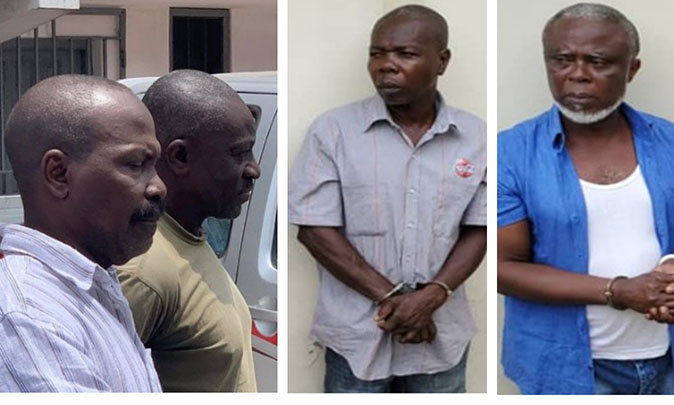The suspects
AN ACCRA High Court has admitted three confession statements of Donny Kafui, aka Ezor, the blacksmith among the 10 people standing trial for allegedly planning to overthrow the government in a coup.
The court, after a mini trial to determine the admissibility or otherwise of the confession, police cautioned statement, and further caution statement, found that the statements were taken in accordance with law.
A three-member panel of the court presided over by Justice Afia Serwaa Asare-Botwe and assisted by Justices Hafisata Amaleboba and Stephen Oppong subsequently dismissed the objection raised by Victor Adawudu, counsel for the accused person, and admitted the confession statements.
The prosecution, through its 13th witness, Chief Inspector Michael Nkrumah, had sought to tender the caution statement and further caution statement in evidence, but the move was opposed by Victor Adawudu, who argued that the statements were not taken voluntarily.
According to him, the statement, dated September 22, 2019, and November 29, 2019, were not made by the accused, who he said is an Ewe who was born, bred and continues to live in Alavanyo in the Volta Region, and there was no way he could have given the statements in the Twi language.
Mr. Adawudu added that Ezor is an illiterate, and the absence of an independent witness sins against the provisions in Section 120 of the Evidence Act, adding that the cautioned statement was thumb printed under duress.
The objection was opposed by the prosecution, led by Winifred Sarpong, a Principal State Attorney, who argued that the investigator knowing the magnitude of the case he was investigating made sure that he went by the book in obtaining statements from all the accused persons, including Ezor.
The court, therefore, held a mini trial to determine the admissibility of the statements, and the prosecution called two witnesses to prove their case, while the accused person himself neither testified nor called any witnesses.
The court in its ruling held that the prosecution had shown sufficiently that they complied with Section 120 of the Evidence Act in the taking of the statements.
The court added that the cross-examination by Mr. Adawudu during the mini trial did not affect the case of the prosecution. It subsequently admitted the confession statements.
Meanwhile, the court is set to conduct another mini trial to determine the admissibility of the confession statements of Yohaness Zikpi, a civilian employee of the Ghana Armed Forces, who is also standing trial for abetment of high treason.
His lawyer, Anthony Lartey, argues that the statements were not given voluntarily, and the case investigator dictated the statement for his client to write down.
BY Gibril Abdul Razak

